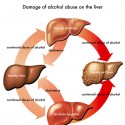Anchorage Battles Chronic Public Drunkenness
On a recent Tuesday night, Anchorage police sergeant Dennis Allen came upon a familiar face at a bus stop. It was Paul, one of Anchorage’s 400 or so homeless alcoholics who chronically get drunk in public.
He was drinking malt liquor from a cup, and Allen made him pour it out. Later Allen came upon Paul again. This time he had a pint of Monarch vodka and a tall can of Steel Reserve.
It was an interaction that had been repeated hundreds of time between the two men, and one that Allen said would probably end with him finding Paul too drunk to safely stay on the street in chilly late autumn temperatures. He’d take him to the city’s sleep-off facility, where a blood-alcohol level in the .30 range — nearly four times the legal limit — isn’t uncommon.
In a long concrete room, Paul could pass out on a plastic mat in the company of dozens of other intoxicated people. When Paul sobered up, he would be released back onto the street.
“The problem is that there’s no consequence to getting drunk in the street,” said Allen, who adds he’s often seen the same people four and five times in a shift.
Anchorage’s longtime problem with what the city terms “chronic public inebriates” returned to the forefront of public debate earlier this year after 13 people – twelve men and one woman — who were either homeless or familiar with life on the street died in quick succession, during relatively mild weather. Alcohol was a common factor in most of the deaths.
In the months since the deaths the city has formed a new task force, hired the first full-time public coordinator for homeless issues and moved to clear out homeless camps that have taken root in the city’s parks and greenbelts.
“The deaths galvanized a lot of people,” said Darrel Hess, the city’s newly appointed homeless coordinator.
Hess and other local leaders agree that tougher action is needed, not only for the safety of the homeless but for the city’s pocketbook: Hess estimates that the city has been spending $4 million per year on a “small subset” of the total homeless population.
A hard-core group of 40-50 of the most severe alcoholics use 90 percent of the resources aimed at them, cycling through emergency rooms, shelters and sleep-off centers on a daily basis.
Among some, there’s a sense that the problem has become so acute that radical new tactics are needed.
“What we’ve been doing has not been working,” said state Sen. Johnny Ellis, D-Anchorage, who championed a new eight-bed detox facility where some of the sickest alcoholics could be involuntarily committed by a judge’s order under state mental health laws.
Ellis said the city’s homeless shelters, soup kitchens and charities have helped to save the lives of street people living in a brutal climate, but have also made it possible for some people to live an alcoholic lifestyle essentially subsidized by taxpayer-funded services.
“We’ve showed our humanity and we’ve saved lives, but the problem is getting worse,” he said.
Many of the people Allen meets on patrol have overstayed a 30-day consecutive stay policy at the Brother Francis Shelter or simply don’t want to abide by shelter rules prohibiting alcohol. They live in sprawling tent cities in parks and greenbelts that have been the site of violent assaults, even murder.
Under the mayor’s order, the city has moved to clear illegal homeless campsites. What they find can be shocking, Allen says.
Workers hauled 12,000 pounds of trash away from one site near an elementary school.
When his unit recently visited one sprawling camp in a stand of birch trees near Valley of the Moon Park to post “No Trespassing” signs, they found piles of discarded clothing, rotting food and two drunk, disoriented people who had vomited on each other and were sleeping on urine-soaked blankets in a tent.
Afterward, the officers sprayed each other with disinfectant.
Advocates for the homeless say that Anchorage should look to cities like Seattle that have tried the “housing first” approach — giving homeless alcoholics subsidized apartments where they are allowed to drink, stabilizing their living situations before tackling other issues.
Brother Francis Shelter manager Dewayne Harris says the idea would surely be controversial in Anchorage, but the model is gaining recognition as the best hope for getting alcoholics permanently off the streets.
source: FOX News


